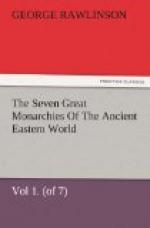The rainy season of Chaldaea is in the winter time. Heavy showers fall in November, and still more in December, which sensibly raise the level of the rivers. As the spring advances the showers become lighter and less frequent; but still they recur from time to time, until the summer sets in, about May. From May to November rain is very rare indeed. The sky continues for weeks or even months without a cloud; and the sun’s rays are only tempered for a short time at morning and at evening by a gray mist or haze. It is during these months that the phenomenon of the mirage is most remarkable. The strata of air, unequally heated, and therefore differing in rarity, refract the rays of light, fantastically enlarging and distorting the objects seen through them, which frequently appear raised from the ground and hanging in mid-air, or else, by a repetition of their image, which is reflected in a lower stratum, give the impression that they stand up out of a lake. Hence the delusion which has so often driven the traveller to desperation—the “image of a cool, rippling, watery mirror,” which flies before him as he advances, and at once provokes and mocks his thirst.
The fertility of Chaldaea in ancient times was proverbial.
“Of all countries that we know,” says Herodotus, “there is none that is so fruitful in grain. It makes no pretension, indeed, of growing the fig, the olive, the vine, or any other tree of the kind; but in grain it is so fruitful as to yield commonly two hundred-fold, and when the production is at the greatest, even three hundred-fold. The blade of the wheat-plant and of the barley-plant is often four fingers in breadth. As for the millet and the sesame, I shall not say to what height they grow, though within my own knowledge; for I am not ignorant that what I have already written concerning the fruitfulness of Babylonia must seem incredible to those who have not visited the country.” Theophrastus, the disciple of Aristotle, remarks—“In Babylon the wheat-fields are regularly mown twice, and then fed off with beasts, to keep down the luxuriance of the leaf; otherwise the plant does not run to ear. When this is done, the return, in lands that are badly cultivated, is fifty-fold; while, in those that are well farmed, it is a hundred-fold.” Strabo observes—“The country produces barley on a scale not known elsewhere, for the return is said to be three hundred-fold. All other wants are supplied by the palm, which furnishes not only bread, but wine, vinegar, honey, and meal.” Pliny follows Theophrastus, with the exception that he makes the return of the wheat-crop, where the land is well farmed, a hundred and fifty-fold. The wealth of the region was strikingly exhibited by the heavy demands which were made upon it by the Persian kings, as well as by the riches which, notwithstanding these demands, were accumulated in the hands of those who administered its government. The money-tribute




